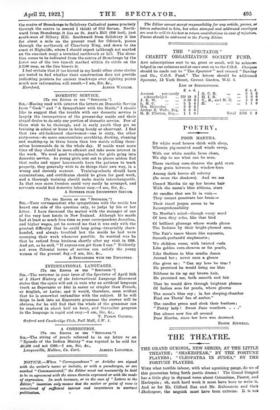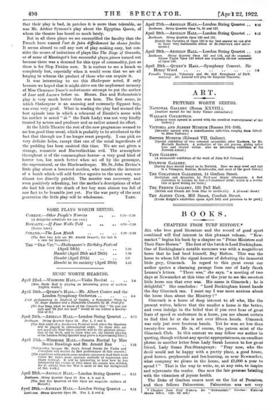THE THEATRE.
THE GRAND GUIGNOL, NEW SERIES, AT DIE LITILE THEATRE; " SHAKESPEAR," BY THE FORTUNE PLAYERS ; " CLEOPATRA IN JUDEA," BY THE FORTUNE PLAYERS.
WITH what terrible labour, with what agonizing pangs, do we of this generation bring forth poetic drama ! The Grand Guignol has a little play in rhymed verse about Columbine, Pierrot, and Harlequin ; oh, such hard work it must have been to write it. And as for Mr. Clifford Bax and Mr. Rubenstein and their Shakespear, the anguish must have been extreme. It is not
that their play is bad, in patches it is more than tolerable,•as was Mr. Arthur Symons's play about the }gyptian Queen, of whom the theatre has heard so much lately.
But in all three plays we see exemplified the faculty that the French have named l'art de faire difficilement les chases facile& It seems absurd to call any sort of play-making easy, but con- sider.the scores of imitations of plays like The Siege of Granada, or of some of Massinger's less successful plays, pieces turned out because there was a demand for this type of commodity, just as there is for Slop Fiction now. It is curious to see a knack so completely lost, especially when it would seem that we are all longing to witness the product of those who can acquire it.
It was interesting to see this Shakespear acted, if only because we hoped that it might drive out the unpleasant memory of Miss Clemence Dane's unfortunate attempt to put the author of Lear and Luerece before us. Messrs. Bax and Rubenstein's play is very much better than was hers. The first scene, in which Shakespear is an amusing and extremely flippant boy, was even very good. What in reading the'play had seemed the best episode (one in which a rehearsal of Hamlet's scene with his mother is acted " " the Dark Lady) was not very kindly treated by actors and producer and so rather missed its effect.
At the Little Theatre the rest of the new programme seemed to me less good than usual, which is probably to be attributed to the fact that through use I no longer react properly. I can pick no very definite holes, except that one of the usual ingredients of the pudding has been omitted this time. We arc not given a strange, romantic and Maeterlinckian evil. The atmosphere throughout is of the commonplace horror-a very good kind of horror too, but much better when set off by the grotesque, the supernatural, or the Bluebeardesque. Mr. St. John Ervine's little play about a bereaved mother, who murders the inventor of a bomb which- will add further agonies to the next war, was almost too directly painful. The murder was necessary, and even positively refreshing, but the mother's descriptions of what she had felt over the death of her boy were almost too full of raw fact to be bearable just yet. For the war party of the next generation the little play will be wholesome. Tays.



































 Previous page
Previous page